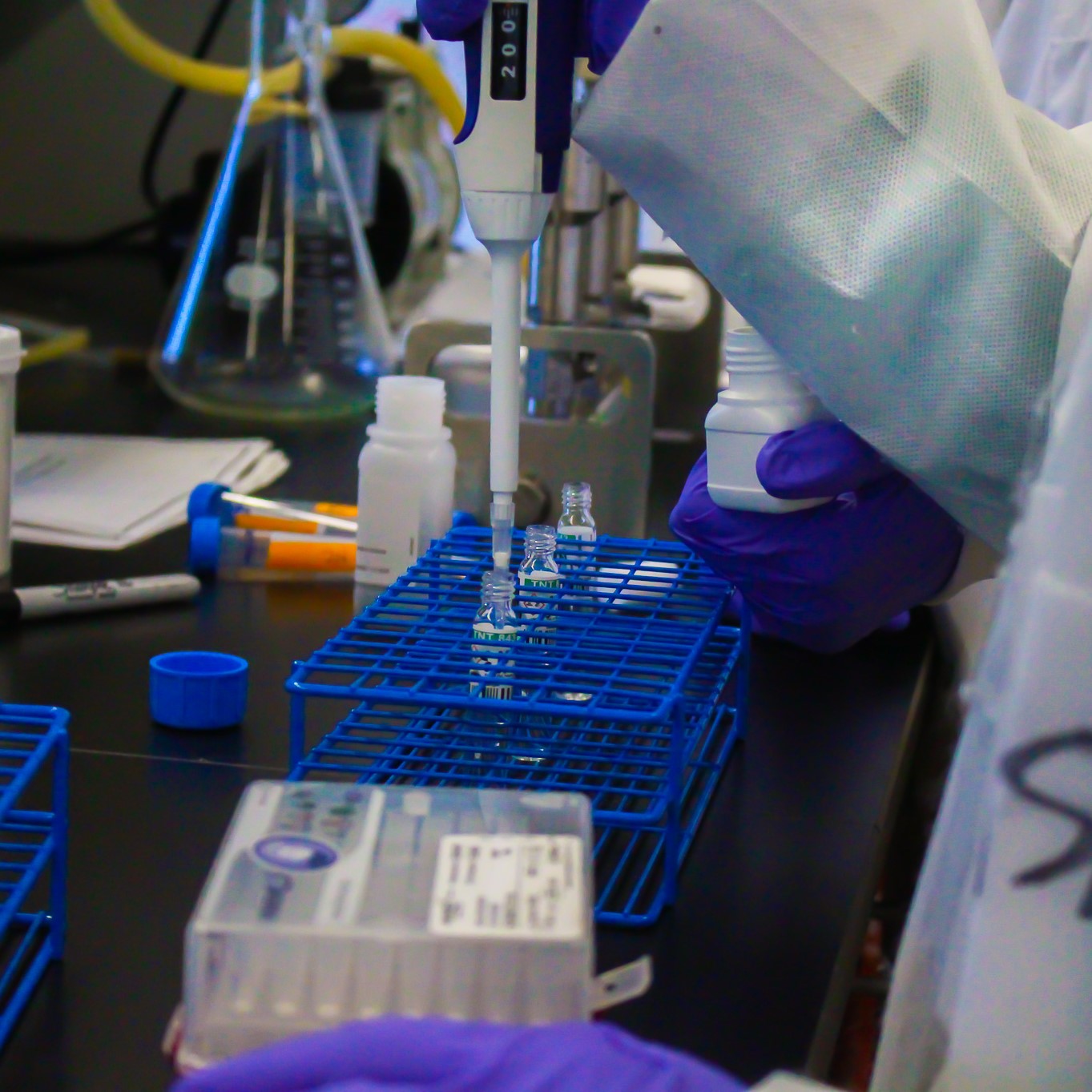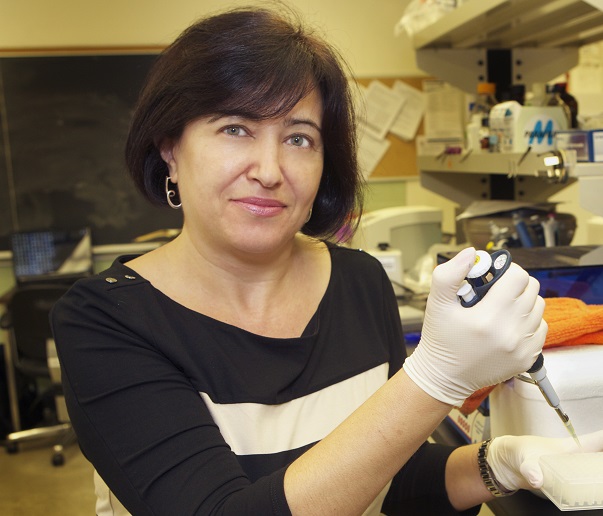 Dr. Krassimira Hristova is an Associate Professor with the Biological Sciences Department and a Director of the Marquette University Global Water Center. Her research interests are in microbial ecology of contaminated freshwater ecosystems and the link between impaired ecosystem services and human health. Her lab investigates environmental factors and spatial and temporal drivers on dissemination of antibiotic resistance genes and bacteria, including human pathogens, in regions of elevated antibiotic use, such as concentrated agriculture. Different project aims to survey the level of antibiotic resistance in sediment and Dreissenid mussels in an urban area, the Milwaukee harbor. The results suggest that mussels reflect temporal trends of pollution and might serve as sentinel organisms. In addition to this work on the ecology of antimicrobial resistance, her lab is evaluating also the impact of man-made materials such as recycled concrete on stream microbial communities and aquatic organisms and the mechanisms and interactions of heavy metals and engineered nanoparticles with eukaryotic cells. Graduate students Rachelle Beattie, Kyle Leistikow and undergraduates Nick Konopek and Rebecca Till are currently working on these projects and the lab is looking for new students to join the research team.
Dr. Krassimira Hristova is an Associate Professor with the Biological Sciences Department and a Director of the Marquette University Global Water Center. Her research interests are in microbial ecology of contaminated freshwater ecosystems and the link between impaired ecosystem services and human health. Her lab investigates environmental factors and spatial and temporal drivers on dissemination of antibiotic resistance genes and bacteria, including human pathogens, in regions of elevated antibiotic use, such as concentrated agriculture. Different project aims to survey the level of antibiotic resistance in sediment and Dreissenid mussels in an urban area, the Milwaukee harbor. The results suggest that mussels reflect temporal trends of pollution and might serve as sentinel organisms. In addition to this work on the ecology of antimicrobial resistance, her lab is evaluating also the impact of man-made materials such as recycled concrete on stream microbial communities and aquatic organisms and the mechanisms and interactions of heavy metals and engineered nanoparticles with eukaryotic cells. Graduate students Rachelle Beattie, Kyle Leistikow and undergraduates Nick Konopek and Rebecca Till are currently working on these projects and the lab is looking for new students to join the research team.
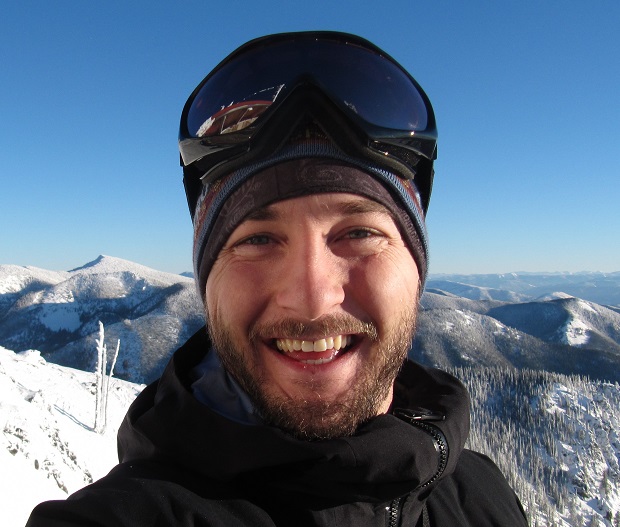 Dr. Chris Marshall is an assistant professor in the Department of Biological Sciences at Marquette, as well as conducting research at the Global Water Center. Dr. Marshall describes his research as: "Wastewater treatment requires an estimated 2% of our global energy expenditure costing tens of billions of dollars. Paradoxically, there is an estimated ten times the amount of energy that can be gained from utilizing wastewater compared to current practices of sinking energy into treating it. This means that harnessed properly, wastewater could be a massive global resource for renewable energy production instead of an energy drain. My lab investigates novel reactor systems that harness fascinating aspects of microbial metabolism to treat wastewater and simultaneously generate renewable chemicals and biofuels. In addition to this work on renewable energy systems, my lab also researches the evolution of antimicrobial resistance and the production of greenhouse gases by microbes in the environment. I am currently looking for grad and undergrad students to work on these projects."
Dr. Chris Marshall is an assistant professor in the Department of Biological Sciences at Marquette, as well as conducting research at the Global Water Center. Dr. Marshall describes his research as: "Wastewater treatment requires an estimated 2% of our global energy expenditure costing tens of billions of dollars. Paradoxically, there is an estimated ten times the amount of energy that can be gained from utilizing wastewater compared to current practices of sinking energy into treating it. This means that harnessed properly, wastewater could be a massive global resource for renewable energy production instead of an energy drain. My lab investigates novel reactor systems that harness fascinating aspects of microbial metabolism to treat wastewater and simultaneously generate renewable chemicals and biofuels. In addition to this work on renewable energy systems, my lab also researches the evolution of antimicrobial resistance and the production of greenhouse gases by microbes in the environment. I am currently looking for grad and undergrad students to work on these projects."
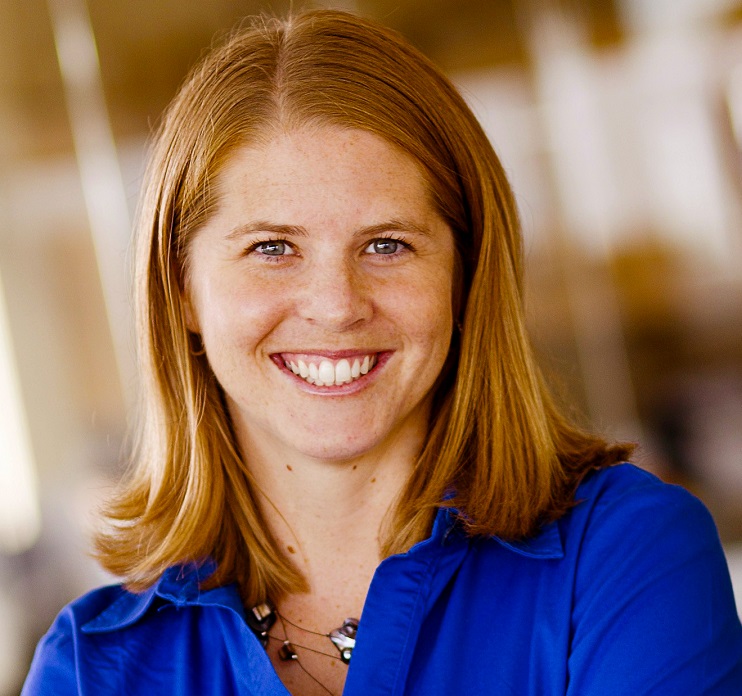
Dr. Brooke Mayer’s research group specializes in physical-chemical treatment processes to both provide safe drinking water and recover valuable materials from wastewater. Her areas of interest include pathogen mitigation (using processes such as electrochemical, UV, etc.) while balancing disinfection byproduct risks, and phosphorus recovery using selective adsorbent materials. Dr. Mayer’s current research team includes: post-doctoral fellow Dr. Kaushik Venkiteshwaran (focus on phosphorus recovery), post-doctoral fellow Dr. Joe Heffron (focus on virus mitigation), PhD student Faten Hussein (focus on phosphorus recovery), PhD student Jonathan Hou (focus on membrane filtration), PhD student Synthia Parveen Mallick (focus on nitrogen recovery), PhD student Donald Ryan (focus on electrochemical processes and DBP mitigation), undergraduate research assistant Nicole Heyniger (focus on UV disinfection), and undergraduate research assistant Caitlin Graeber (focus on phosphorus recovery).
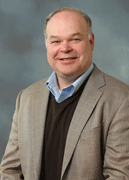
Dr. Daniel Zitomer, P.E., BCEE is Professor and Chair of the Department of Civil, Construction and Environmental Engineering. He is on the Leadership Team of the NSF Great Lakes ReNEW Innovation Engine, a center dedicated to water tech R&D as well as job training. Dr. Zitomer is also the Site Director of the NSF I/UCRC Center on Water Equipment and Policy and Director of the Marquette University Water Quality Center. Dr. Zitomer's research involved anaerobic biotechnology for industrial and municipal wastewater, residual and solids management via thermochemical and other technologies and chemical oxidation of complex wastewater. He teaches classes in civil and environmental engineering, wastewater management/treatment and biotechnology for wastewater management including anaerobic and other approaches.
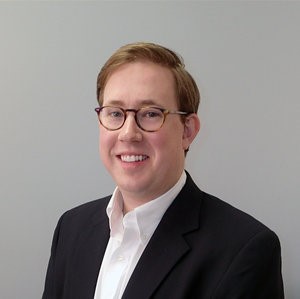
Dr. Walter McDonald is an assistant professor of Civil, Construction, & Environmental Engineering at Marquette University, and the leader of the McDonald Hydrology research group. The McDonald Hydrology research group at Marquette University seeks to develop novel methods to monitor, model, and manage stormwater under changing land use and climate variability. Our work also leverages emerging technologies to develop a greater understanding of stormwater systems and improve management efforts. Current projects include monitoring the pollutant removal efficiency of green stormwater infrastructure, developing smart active controls for stormwater systems, and evaluating the impact of green infrastructure on sanitary sewer inflow and infiltration. Students: Charitha Gunawardana, Ph.D.; Spencer Sebo, M.S.; Elizabeth Regier, M.S.; Nathan Hay, M.S.; Kassidy O'Malley, M.S. (co-advised w/ Dr. Patrick McNamara)
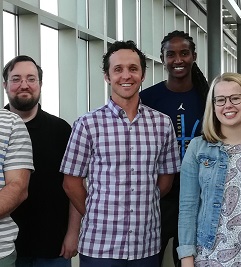
Dr. Patrick McNamara researches the interface of chemistry and microbiology in the built environment. He is an environmental engineer who focuses on drinking water and wastewater treatment systems. His group studies how treatment systems can be used to remove micropollutants as well as how micropollutants can impact treatment systems. He studies biological contaminants such as antibiotic resistance genes and organic chemical contaminants such as pharmaceuticals. His current research team includes:
Graduate students: Lee Kimbell (antibiotic resistance in drinking water distribution systems); Donald Ryan (electrocoagulation for drinking water treatment); Eileen Kennedy (dewaterability of sludge); Kassidy O'Malley (antibiotic resistance in stormwater); Undergraduate students:Nicole Heyniger (removal of antibiotic resistance in drinking water); Caitlin Graeber (conversion of phosphorus in wastewater); Claire Connely (conversion of phosphorus in wastewater); Stan Kohls (antibiotic resistance in wastewater).
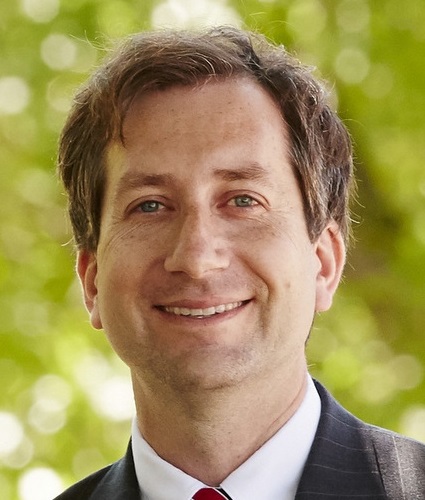
Professor David Strifling is the Director of Marquette Law School's Water Law and Policy Initiative. Using an interdisciplinary and collaborative approach, the Initiative seeks to assess the legal and regulatory aspects of water policy, to pursue opportunities for information exchange and collaboration, and to provide the means for interested persons to become better informed on legal and policy aspects of critical water issues at the local, national, and global levels.
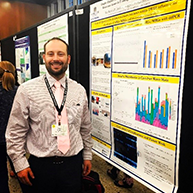 Lee Kimball is a PhD candidate at Marquette university in the Environmental and Water Resources Engineering department working with Dr. McNamara. His specific project is an NSF funded project analyzing the impact of metal pipe materials, corrosion inhibitors, and corrosion products on antibiotic resistance in drinking water distribution systems.
Lee Kimball is a PhD candidate at Marquette university in the Environmental and Water Resources Engineering department working with Dr. McNamara. His specific project is an NSF funded project analyzing the impact of metal pipe materials, corrosion inhibitors, and corrosion products on antibiotic resistance in drinking water distribution systems.
 Dr. Krassimira Hristova is an Associate Professor with the Biological Sciences Department and a Director of the Marquette University Global Water Center. Her research interests are in microbial ecology of contaminated freshwater ecosystems and the link between impaired ecosystem services and human health. Her lab investigates environmental factors and spatial and temporal drivers on dissemination of antibiotic resistance genes and bacteria, including human pathogens, in regions of elevated antibiotic use, such as concentrated agriculture. Different project aims to survey the level of antibiotic resistance in sediment and Dreissenid mussels in an urban area, the Milwaukee harbor. The results suggest that mussels reflect temporal trends of pollution and might serve as sentinel organisms. In addition to this work on the ecology of antimicrobial resistance, her lab is evaluating also the impact of man-made materials such as recycled concrete on stream microbial communities and aquatic organisms and the mechanisms and interactions of heavy metals and engineered nanoparticles with eukaryotic cells. Graduate students Rachelle Beattie, Kyle Leistikow and undergraduates Nick Konopek and Rebecca Till are currently working on these projects and the lab is looking for new students to join the research team.
Dr. Krassimira Hristova is an Associate Professor with the Biological Sciences Department and a Director of the Marquette University Global Water Center. Her research interests are in microbial ecology of contaminated freshwater ecosystems and the link between impaired ecosystem services and human health. Her lab investigates environmental factors and spatial and temporal drivers on dissemination of antibiotic resistance genes and bacteria, including human pathogens, in regions of elevated antibiotic use, such as concentrated agriculture. Different project aims to survey the level of antibiotic resistance in sediment and Dreissenid mussels in an urban area, the Milwaukee harbor. The results suggest that mussels reflect temporal trends of pollution and might serve as sentinel organisms. In addition to this work on the ecology of antimicrobial resistance, her lab is evaluating also the impact of man-made materials such as recycled concrete on stream microbial communities and aquatic organisms and the mechanisms and interactions of heavy metals and engineered nanoparticles with eukaryotic cells. Graduate students Rachelle Beattie, Kyle Leistikow and undergraduates Nick Konopek and Rebecca Till are currently working on these projects and the lab is looking for new students to join the research team. Dr. Chris Marshall is an assistant professor in the Department of Biological Sciences at Marquette, as well as conducting research at the Global Water Center. Dr. Marshall describes his research as: "Wastewater treatment requires an estimated 2% of our global energy expenditure costing tens of billions of dollars. Paradoxically, there is an estimated ten times the amount of energy that can be gained from utilizing wastewater compared to current practices of sinking energy into treating it. This means that harnessed properly, wastewater could be a massive global resource for renewable energy production instead of an energy drain. My lab investigates novel reactor systems that harness fascinating aspects of microbial metabolism to treat wastewater and simultaneously generate renewable chemicals and biofuels. In addition to this work on renewable energy systems, my lab also researches the evolution of antimicrobial resistance and the production of greenhouse gases by microbes in the environment. I am currently looking for grad and undergrad students to work on these projects."
Dr. Chris Marshall is an assistant professor in the Department of Biological Sciences at Marquette, as well as conducting research at the Global Water Center. Dr. Marshall describes his research as: "Wastewater treatment requires an estimated 2% of our global energy expenditure costing tens of billions of dollars. Paradoxically, there is an estimated ten times the amount of energy that can be gained from utilizing wastewater compared to current practices of sinking energy into treating it. This means that harnessed properly, wastewater could be a massive global resource for renewable energy production instead of an energy drain. My lab investigates novel reactor systems that harness fascinating aspects of microbial metabolism to treat wastewater and simultaneously generate renewable chemicals and biofuels. In addition to this work on renewable energy systems, my lab also researches the evolution of antimicrobial resistance and the production of greenhouse gases by microbes in the environment. I am currently looking for grad and undergrad students to work on these projects."




 Lee Kimball is
Lee Kimball is 